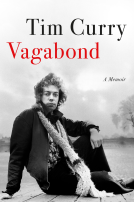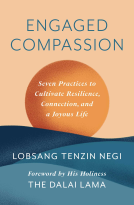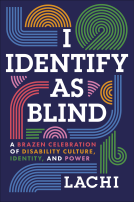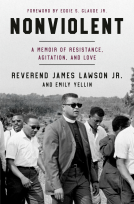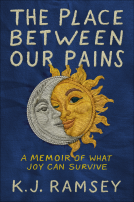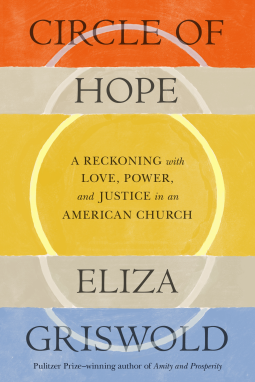
Circle of Hope
A Reckoning with Love, Power, and Justice in an American Church
by Eliza Griswold
This title was previously available on NetGalley and is now archived.
Send NetGalley books directly to your Kindle or Kindle app
1
To read on a Kindle or Kindle app, please add kindle@netgalley.com as an approved email address to receive files in your Amazon account. Click here for step-by-step instructions.
2
Also find your Kindle email address within your Amazon account, and enter it here.
Pub Date Aug 06 2024 | Archive Date Sep 06 2024
Description
A National Book Award Finalist
Named a Best Book of the Year by The New York Times, The Washington Post, The New Yorker, NPR, The Minnesota Star Tribune, and Publishers Weekly
“Glows on every page . . . nearly miraculous.” —The Boston Globe
“Marvelous.” —The New York Times
From the Pulitzer Prize winner Eliza Griswold, Circle of Hope is an intimate portrait of a church, its radical mission, and its riveting crisis.
“The revolution I wanted to be part of was in the church.”
Americans have been leaving their churches. Some drift away. Some stay home. And some have been searching for—and finding—more authentic ways to find and follow Jesus.
This is the story of one such “radical outpost of Jesus followers” dedicated to service, the Sermon on the Mount, and working toward justice for all in this life, not just salvation for some in the next. Part of a little-known yet influential movement at the edge of American evangelicalism, Philadelphia’s Circle of Hope grew for forty years, planted four congregations, and then found itself in crisis.
The story that follows is an American allegory full of questions with urgent relevance for so many of us, not just the faithful: How do we commit to one another and our better selves in a fracturing world? Where does power live? Can it be shared? How do we make “the least of these” welcome?
Building on years of deep reporting, the Pulitzer Prize winner Eliza Griswold has crafted an intimate, immersive, tenderhearted portrait of a community, as well as a riveting chronicle of its transformation, bearing witness to the ways a deeply committed membership and their team of devoted pastors are striving toward change that might help their church survive. Through generational rifts, an increasingly politicized religious landscape, a pandemic that prevented gathering to worship, and a rise in foundation-shaking activism, Circle of Hope tells a propulsive, layered story of what we do to stay true to our beliefs. It is a soaring, searing examination of what it means for us to love, to grow, and to disagree.
A Note From the Publisher
Advance Praise
★ “Riveting . . . A fascinating inquest into the death of a church that doubles as a compassionate case study on the insufficiency of good intentions.” —Publishers Weekly (starred review)
“Eliza Griswold is a dazzling reporter: ever observant, wise, sympathetic, and honest. And in this spellbinding book, she not only immerses herself in a radical religious community but also reveals its fracturing in real time, raising questions about the nature of faith and justice and what binds us as Americans.” —David Grann, author of The Wager
“Circle of Hope is that rarest of books: An examination of the sacred and spiritual realm captured with humor, humanity, and style.” —Susan Orlean, author of On Animals
“Set against the backdrop of race, sexuality, and belief, Circle of Hope is a deeply captivating and sometimes troubling dive into a world of faith and frustrations often hidden by the political, antagonistic, and triumphalist projections of American Evangelicalism.” —Anthea Butler, author of White Evangelical Racism
“Lyrical, probing, and deeply reported, this is an extraordinary account of the fraught interplay of faith, community, and values in a moment of high jeopardy. With astonishingly unfettered access to her subjects, Griswold has produced a multigenerational group portrait that is compassionate yet unblinking and will resonate with anyone—even a heathen like me—who aspires to chart a righteous path through this messy, mixed-up world.” —Patrick Radden Keefe, author of Empire of Pain
“Circle of Hope is a rare and astonishing trek into the fractured soul of America, as told through the deeply reported and beautifully rendered story of one church’s crucible.” —Andrea Elliott, author of Invisible Child
“Eliza Griswold is a dazzling reporter: ever observant, wise, sympathetic, and honest. And in this spellbinding book, she not only immerses herself in a radical religious community but also reveals its fracturing in real time, raising questions about the nature of faith and justice and what binds us as Americans.” —David Grann, author of The Wager
“With patience, intelligence, and compassion, Eliza Griswold traces the history of a Christian community and its leadership struggling to remain faithful to a radical vision through times of immense stress. As vivid as any novel, it is more than just a chronicle of one network of congregations. It holds up a mirror to a society whose inherited fragmentations and injustices around gender, sexuality, race, and class can work destructively even among the most conscientious and generous. But it also quietly shows the durability of the basic commitments that its central characters try to honor, even in seasons of conflict. A sharply contemporary book, painfully honest, stubbornly hopeful.” —Rowan Williams, author of Passions of the Soul
“This is a lucid, tough, sad, heartening, and ultimately very wise book. At a time when American Christianity is obviously undergoing profound change, Eliza Griswold shines a generous but unsparing spotlight on a single church in crisis. Her book will be both beacon and warning to anyone invested in this change and to those experiencing similar reckonings in their own communities.” —Christian Wiman, author of Zero at the Bone
“In this haunting account of a community of faith and its unraveling, Eliza Griswold offers a stirring portrait of good intentions gone awry. A story of both truth and grace, Circle of Hope traces in devastating detail how justice and kindness give way to callous pursuits of power inside one progressive evangelical church. Yet even in the ruins of division and disillusionment, a chastened hope endures. The result is a searing reflection on the state of American religion, and on the challenges of holding together against the forces pulling us apart.” —Kristin Kobes Du Mez, author of Jesus and John Wayne
“I devoured this book. What begins as the story of a church quickly becomes a portrait of the uncategorizable complexity of human beings. It made me examine the cost of centering my own self-regard, the need to see oneself as a ‘good person.’ It insists we look longer than a few seconds, deeper than a few inches. Eliza Griswold is a master of immersive journalism. I cannot recommend Circle of Hope enough.” —Nadia Bolz-Weber, author of Accidental Saints
“Circle of Hope is the kind of book that bears witness to its name. Eliza Griswold masterfully weaves together intimate portraits of real human beings in real places with real problems. What comes of their lives—as with anything that falls apart, crawling slowly toward putting itself back together—is a story that is both beautiful and haunting, that does justice to the reporter’s eye and the essayist’s heart, that is acquainted with the difficult parts of our humanity, that uses well the language that makes sense of it, in such a way that is gorgeous and illuminating. This book is an act of courage, vulnerability, and creativity—all things that make Griswold’s seasoned voice once again strike with strength.” —Dante Stewart, author of Shoutin’ in the Fire
“With the deftness and empathy that only Eliza Griswold can provide, Circle of Hope reminds readers that there is still a great liberal Protestant tradition in the United States. Yet, despite their lofty goals, these religious communities still face the same tragedy and tumult as any other organization. Griswold’s intimate portrait of real people trying to live out an authentic faith in a rapidly secularizing world should inspire us to continue to live up to our highest ideals, despite all the setbacks that come as a result.” —Ryan Burge, author of The Great Dechurching
“Millions of people have left the church because it is full of hypocrites. This basic fact of fallibility, frustrating as it can be, is why I have stayed. The church is a home for hypocrites like me. Eliza Griswold’s intimate portrait of one congregation introduces characters who are real enough to unveil something of the mystery of how a group of broken people who don’t live up to their ideals can, despite themselves, become good news.” —Jonathan Wilson-Hartgrove, author of Revolution of Values
Available Editions
| EDITION | Other Format |
| ISBN | 9780374601683 |
| PRICE | $30.00 (USD) |
| PAGES | 352 |
Available on NetGalley
Average rating from 15 members
Featured Reviews
If I were to describe the church at the center of Pulitzer Prize-winning author Eliza Griswold's "Circle of Hope: A Reckoning with Love, Power, and Justice in an American Church," I would likely use a term popularized by folks like Tony Campolo and Shane Claiborne - "red letter Christian."
Started by Rod White, Circle of Hope could easily have been seen as a cousin to The Simple Way, the intentional community co-founded by Shane Claiborne that burst to familiarity after the popularity of Claiborne's "The Irresistible Revolution" became a bestseller. Claiborne's was a, and still is to a degree, the kind of popularity to which Jonny, one of the Circle of Hope pastors chronicled by Griswold, would likely aspire.
It has been these kinds of churches that have drawn a broad tapestry of believers. These are people tired of church in the traditional way yet not quite ready to let it go. They want to do church differently. When White and his family founded Circle of Hope in hopes of creating just such a home, a different kind of church that would love all and include all. Words like emergent, new monastic, and others offer a way to understand these churches, but they have always tended to draw the "other Christians" - people wounded by the church or deconstructionists or people who simply believe there has to be a better way.
Truthfully, after reading"Circle of Hope" I'm starting to wonder if there is a better way.
It's well known and well documented that church attendance in America is down. Churches are dying or becoming a fraction of what they used to be.
Griswold's "Circle of Hope" immerses us within Philly's Circle of Hope, a church that began as one central body with a vision of being radically different and dedicated to living out the red letters. Pastor White was its pastor, though he enthusiastically fostered leadership growth that would eventually identify the individuals in "Circle of Hope." When White stepped down from leadership, not so much leaving the congregation as widening its leadership, it would fall upon the likes of Rachel, Jonny, Julie, and Ben (White's son) to lead the church. White had left the church at a time when four distinct congregations existed, though in theory they were guided by united pastors.
"Circle of Hope" immerses us into the the journey of this "radical outpost of Jesus followers" in Philly. They were dedicated to service, the Sermon on the Mount, social justice, and toward having difficult conversations.
Circle of Hope is not the only such church in this relatively unknown yet influential movement that exists on the edge of what is known as evangelicalism. As a church, it grew for forty years and from one to four congregations.
Then, crisis would hit - generational differences, an increasingly politicized religious landscape, the COVID pandemic that prevented gathering in worship, and a rise in activism that demanded more than simply marching. Suddenly, this church which was founded as part of the peaceful Anabaptist movement struggled to know how to lean into its values.
If it feels like this is some jaded expose of contemporary Christianity, think again. Griswold immersed herself within the life of Circle of Hope with their permission. As she notes eloquently in her final words, a benediction of sorts, it was a permission that none could have realized would end up providing an up close and deeply personal view of everything we love about church and everything that makes us need to deconstruct the church experience.
It took almost unfathomable bravery and transparency, spirit-led really, for the White family to continue participating within this project even as it began to express itself differently. It took remarkable leadership for these four pastors plus others within Circle of Hope to vulnerably continue sharing life-shaking journeys. Remarkable.
"Circle of Hope" is immersive. It is explosive. It is intimate and tender and wise and respectful. Griswold's background as a journalist is evident throughout, neither offering an overly sympathetic account nor doing some sort of journalistic body slam of this church and these lives. Instead, this feels like truth over and over and over again.
Questions of power come up over and over and over again - gender based, race based, and so much more. Vital questions are asked and the answers aren't always pretty. How do we welcome the least of these? How do we commit to one another in a fractured world? Does power have a home in the church and can it genuinely be shared?
"Circle of Hope" is a revelation. You will feel immersed in the lives of these people and these pastors. If you're a Christian, you'll likely find yourself saying "I would never go to so-and-so's church" or "this pastor sounds amazing." Griswold doesn't decide for us if there are bad characters here - she simply shares the story and immerses us in its fullness. I found myself most drawn to Rachel as a pastor, though by the end of "Circle of Hope" everyone here is richly human, undeniably flawed, desperate to be loving, learning how to grow, struggling to disagree, and both part of the problem and part of its potential solution.
If you've ever been a pastor, and I have, "Circle of Hope" will ring as familiar and yet will tug at your heart, your mind, and your spirit.
"Circle of Hope" is a must-read for American churchgoers and anyone who has experienced what is described here as a "reckoning" with love, power, and justice while learning what it means to be the Church.
Readers who liked this book also liked:
We Are Bookish
Biographies & Memoirs, Health, Mind & Body, Nonfiction (Adult)
We Are Bookish
Historical Fiction, Literary Fiction, Multicultural Interest
Publishers Lunch
General Fiction (Adult), Nonfiction (Adult), Teens & YA









